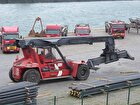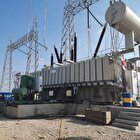Oil Spill Clean Up in Dehloran Oilfield with Iranian Researchers’ Method

According to a report by the Iranian Vice Presidency for Science and Technology and Knowledge-Based Economy, Saman Hosseini in cooperation with a research team conducted a research on how to clean up oil spills in the oilfields of Naft Shahr, Kermanshah Province and Dehloran in Ilam province in the Western part of Iran. The research was supported by Biotech Development Council.
The previous project done by the same research team was carried out in Naft Shahr District and under the supervision of Iranian Central Oilfields Company, which successfully cleaned up oil spills in Naft Shahr District at the right time. Later, West Oil Company requested that the achievement of the project be used in coordination with the Department of Environment in the Dehloran oil region too. The Dehlran oil rich region had been affected by severe oil pollution and was highly contaminated.
Preliminary studies by the research team showed that the Dehloran Oilfield was in a different condition than Naft Shahr's, then it was decided a new research to be done there to obtain new bacerial isolates compatible with the new conditions.
Supported by Biotech Development Council, the researcher team consisted of university graduates started their studies on the contaminated soil with oil spills in Dehloran in Summer 2022. The soil samples were collected and after examining the physical and chemical properties of the soil, the bacterial isolates were separated and the efficiency of the superior bacterial isolates in biodegrading the crude oil in the region and tolerance level against environmental conditions were studied, the Vice Presidency’s report added.
Soil contamination in the studied area was about 8%, which is considered a very high. The soil of the area was sandy, alkaline and wet, in the meantime, soil salinity was very high. 37 bacterial isolates were separated from soil samples. Among them, five selected isolates were able to consume more than 85% of crude oil at a rate of nearly 90 mg/L/h after four days of being in liquid broth medium, which is considered a significant capability.
The final goal of the research was to achieve a formulation containing several bacterial isolates (microbial consortium) that can be effective in different environmental conditions to fully biodegrade various compounds in crude oil.
4155/i





















